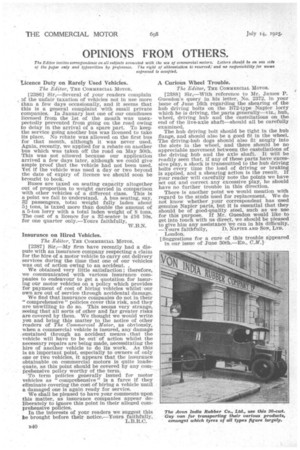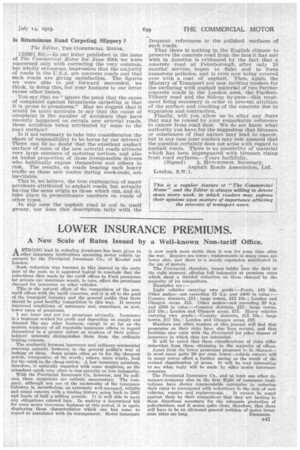OPINIONS FROM OTHERS.
Page 24

Page 25

If you've noticed an error in this article please click here to report it so we can fix it.
The Editor invites correspondence on all subjects connected with ihe use of commercial motors. Letters shoul,d be on 0116 side of the paper only and typewritten. by preference. The right of abbreviation is reserved; and no resporisibility for views
expressed is accepted,
Licence Duty on Rarely Used Vehicles.
The Editor, THE COMMERCIAL MOTOR.
[2386] Sir,—Several of your readers complain
of the unfair taxation of vehicles not in use more than a few days occasionally, and it seems that this is a general complaint with small private companies. In January last one of our omnibuses licensed from the 1st of the month was unexpectedly prevented from going on the road owing to delay in the arrival ofa spare part. To keep the service going another bus was licensed to take its place. No rebate was allowed on the first bus for that month, although it was never used. Again, recently, we applied for a rebate on another bus which was taken off the road on May 30th. This was not allowed because our application arrived a few days later, although we could give ample proof that the vehicle had not been used. Yet if the vehicle was used a day or two beyond the date of expiry of licence we should soon be brought to book.
Buses are taxed on seating capacity altogether out of proportion to weight carried in comparison with other vehicles of a different class. This is a point we fail to understand. A bus seating, say, 32 passengers, total weight fully laden about 51 tons, is taxed more than double the amount of a 5-ton lorry with a total laden weight of 8 tons. The cost of a licence for a 32-seater is 11.6 10s. for one quarter only.—Yours faithfully, W.B.N.
Insurance on Hired Vehicles.
The Editor, TEE COMMERCIAL MOTOR.
[2387] Sir,—My firm have recently had a dispute with an insurance company respecting a claim for the hire of a motor vehicle to carry out delivery services during the time that one of our vehicles was out of action owing to an accident. „ We obtained very little satisfaction ; therefore, we communicated with various insurance companies to endeavour to get a quotation for insuring our motor vehicles on a policy which provides for payment of cost of hiring vehicles whilst our own are out of service through accidental damage.
We find that insurance companies do not in their " comprehensive " policies cover this risk, and they are unwilling to do so. This seems very strange, seeing that all sorts of other and far greater risks are covered by them. We thought we would write you and bring this matter to the notice of other readers of The Corrameretal Motor, as obviously, when a commercial vehicle is insured, any damage sustained through an accident means that the vehicle will have to be out of action whilst the necessary repairs are being made, necessitating the hire of another vehicle to do its work. As this is an Important point, especially to owners of only one or two vehicles, it appears that the insurance obtainable on commercial motors is quite inadequate, as this point should. be covered by any comprehensive policy worthy of the term. To term policies generally issued for motor vehicles as " comprehensive " is a farce if they eliminate covering the cost of hiring a vehicle until a damaged one is again ready for service.
We shall be pleased to have your comments upon this matter, as insurance companies appear deliberately to ignore this point in their alleged comprehensive policies.
In the interests of your readers we suggest this be brought before their notice.—Yours faithfully, L.B.R.C. MO A Curious Wheel Trouble.
The Editor, THE COMMERCIAL MOTOR.
[2388] Sir,—With reference to Mr. James P. Guesdon's query in his letter, No. 2372, in your issue of June 16th regarding the shearing of the hub driving bolts on the B72-type Napier lorry which he is driving, the parts generally—viz., hub, wheel, driving hub and the castellations on the end of the live-axle shaft—should all be carefully examined.
The hub driving bolt should be tight in the hub flange, and should also be a good fit in the wheel. The driving-hub dogs should also fit snugly into the slots in the wheel, and there should be no appreciable movement between the castellations of the driving hub and the axle shaft. It will be readily seen that, if any of these parts have excessive play, a shock is transmitted to the hub driving bolts every time the load of driving or braking Is applied, and a shearing action is the result. If your reader will carefully note the points we have set out and correct any excessive play, he should have no further trouble in this direction.
There is another point we would mention with regard to the studs used for replacement. We do not know whether your correspondent has used genuine Napier parts, but it is essential that they should be of good-quality steel, such as we use for this purpose. If Mr. Guesdon would like to get into touch with us direct, we should be pleased to give him any assistance we can in his difficulty.
—Yours faithfully, D. NAPIER AND SON, LTD. London. [Suggestions for a cure of this trouble appeared in our issue of June 30th.—En., C.M.], Is Bituminous Road Carpeting Slippery ?
The Editor, THE COMMERCIAL MOTOR.
[2389] Sir,—In our letter published in the issue of The Commercial Motor for June .30th we were concerned only with correcting the very common, but wholly erroneous, impression that the majority of roads in the U.S.A. are concrete roads and that -such roads are giving satisfaction. The figures we were able to put forward succeeded, we think, in doing this, but your footnote to our letter raises other issues.
You say that we "ignore the point that the cause of complaint against bituminous carpeting is that it is prone to greasiness." May we suggest that it would be more accurate to say that the cause of complaint is the number of accidents that have recently happened on certain new arterial roads, these accidents being attributed by .sonie to the road surface?
Is it not necessary to take into consideration the share of responsibility to be borne by car drivers? There can be no doubt that the excellent asphalt surface of some of the new arterial roads attracts very large numbers of motoring novices, and also an undue proportion of those irresponsible drivers' who habitually expose themselves and others to risk. The results, on roads bearing such heavy traffic as these new routes during week-ends, are inevitable.
This is, we believe, the true explanation. of many accidents attributed to asphalt roads, but actually having the same origin as those which can, and do, take place in proportionate numbers on roads of other types.
In any ease the asphalt road is not in itself greasy, nor does this description tally with the frequent references to the polished surfaces of such roads.
That there is nothing in the English climate to preserve the concrete road from the fate it has met with in America is evidenced by the fact that a concrete road at Peterborough, after only 18 months' service, began to flake. • and to form numerous potholes, and is even now being covered over with a coat of asphalt. Then, again, the Ministry of Transport are now inviting tenders for the surfacing with asphalt material of two further concrete roads in the London area, the PurfieetTilbury road and the Sidcup by-pass—this treatment being necessary in order to prevent attrition of the surface and cracking of the concrete due to expansion and contraction.
Finally, will you allow us to allay any fears that may be roused by your remarkable reference to cancer from road dust. We do not know what authority you have for the suggestion that bitumen or substances of that nature may lead to cancer, but in any case your readers may rest assured that the question certainly does not arise with regard to asphalt roads. There is no possibility of material which has been impregnated with bitumen rising from road surfaces.—Yours faithfally, (Signed) A. FluvcancsobT, Secretary, Asphalt Roads Association, Ltd. London, &W.1.




























